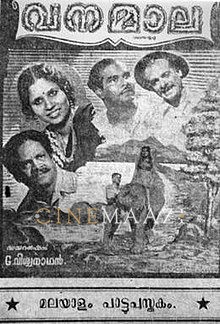This section is for paid subscribers only. Our subscription is only $3700/- for one full year.
You get unlimited access to all paid section and features on the website with this subscription.
Subscribe to read full article
This section is for paid subscribers only. Our subscription is only $37/- for one full year.
You get unlimited access to all paid section and features on the website with this subscription.
Not ready for a full subscription?
You can access this article for $2, and have it saved to your account for one year.
- Release Date09/06/1951
- FormatB-W
- LanguageMalayalam
Ramonda is the zamindar of Vasantha Vilas. He has a daughter Mala, born after many years of marriage. When Mala is born, he puts a locket around her neck. Previously, he had promised to adopt Ashokan, his secretary’s son. However, Mala’s birth changes things. Incensed, the secretary Prasad engages his fathful servant Babu to kill Mala. Babu cannot bring himself to do so, and he abandons her in the forest. Mala is taken in by a tribal couple. She grows up as Nalini, and an elephant becomes her constant companion.
Ramonda moves to Sivalokam estate on the outskirts of the forest. He is accompanied by Prasad and Ashokan. Ashokan and Nalini meet in the forest and fall in love. Prasad, however, recognizes Nalini for who she is. He thinks if she is left to live, Ashokan will lose his inheritance. He tries to separate the two lovers, but in vain. Prasad requests Ashokan to leave the estate. He complies, but remains in the forest in disguise. Prasad’s attempt to murder Nalini is thwarted by Ashokan. In the ensuing conflict, Nalini stabs Prasad to death. As he breathes his last, Prasad reveals to Ramonda that Nalini is his long-lost daughter Mala. Ramonda gives her hand in marriage to Ashokan.
Considered the first ‘jungle movie’ in Malayalam, Vanamala starred P.A. Thomas and the debutant Neyyattinkara Komalam in a role similar to that of Lady Tarzan. The film also featured an elephant ‘Baby Lakshmi’. Vanamala was primarily shot at Udaya Studios, while a few scenes were shot near Pechippara Dam, near Marthandam. Most of the scenes involving wild animals were copied from foreign films. The film included nine songs, most of which were copies of popular Hindi tunes. The solo by Jikki, Thalli thalli haa was a direct copy of the popular duet Gore gore O baanke by Lata Mangeshkar and Ameerbai Karnataki from the Hindi film Samadhi (1950).

Cast
-
P A Thomas
Ashokan - the son of Prasad -
Neyyattinkara Komalam
Nalini/Mala- the Zamindar's daughter
Crew
-
BannerV & C Productions
-
Director
-
Music Director
-
Lyricist
-
Story Writer
-
Cinematography







.jpg)



